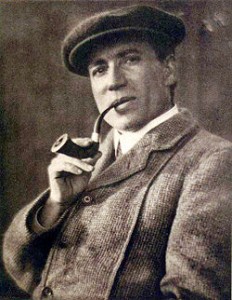 Despite living a significant part of his life without a home, W H Davies was one of the most popular poets of his time. Born in Newport, Wales, in 1871, the son of an iron worker, Davies lost his father when he was three years old and subsequently went to live with his grandparents. He was a troublesome child, attending Temple School but getting himself arrested with some class mates for stealing handbags – behavior that got him a reputation and 12 strokes of the birch.
Despite living a significant part of his life without a home, W H Davies was one of the most popular poets of his time. Born in Newport, Wales, in 1871, the son of an iron worker, Davies lost his father when he was three years old and subsequently went to live with his grandparents. He was a troublesome child, attending Temple School but getting himself arrested with some class mates for stealing handbags – behavior that got him a reputation and 12 strokes of the birch.
Davies wrote his first poem, Death, when he was 14 which was prompted by the moment he was asked to sit with his grandfather who was dying at the time. He went to work at an early age, first for an ironmongers and then as a frame maker for which he was supposed to undertake a long term apprenticeship. The difficulty of his youth followed him into work though and he found it all but impossible to settle down to the life his grandmother wanted for him.
Determined to go to America, he left his apprenticeship and began to take casual jobs, crossing the Atlantic several times over the next five years. He lived largely as a tramp or hobo, taking casual work when he could but generally begging and even opting to spend some time in jail in Michigan to avoid the cold winter.
Intending to go to the Klondike and earn his fortune during the Gold Rush, Davies attempted to jump on board a train, lost his footing and fell. The resulting accident meant that his leg had to be amputated and was a major turning point in his life in more ways than one. Many observers suggest that it was this incident above all others that led him to become a working poet.

When he got back to Britain, Davies lived rough on the streets where he would compose several poems in his mind before eventually writing them down. His first collection was self-published. The Soul’s Destroyer marked a change in his fortunes and he would often individually post copies of the book to people he had picked out of Who’s Who.
One of those people was a journalist for the Daily Mail Arthur Adcock who arranged to meet with Davies and the first properly published edition of the collection came out in 1907 and would go through several imprints. Other help for Davies’ career came from Edward Thomas, a literary critic, who put him in lodgings in Kent, allowing him the time to devote to his writing.
In 1907, Davies wrote and published The Autobiography of a Super-Tramp which had a forward by George Bernard Shaw. Davies became well-known in the literary circles of London and would regularly give public readings of his poems alongside luminary greats such as Yeats and Ezra Pound. Most people will know the opening stanza of his most famous poem Leisure that was published in 1911 in the collection Songs of Joy and Others.

Davies married Helen Payne in 1923, a woman who was nearly thirty years younger than him. Helen was pregnant at the time he met her and suffered a miscarriage that nearly took her life though the couple lived together quite happily until Davies passed away. Davies was suffering from ill health which dogged him over his final years. He eventually died in 1940 at the age of 69.

